英汉翻译技巧
- 格式:doc
- 大小:330.00 KB
- 文档页数:48
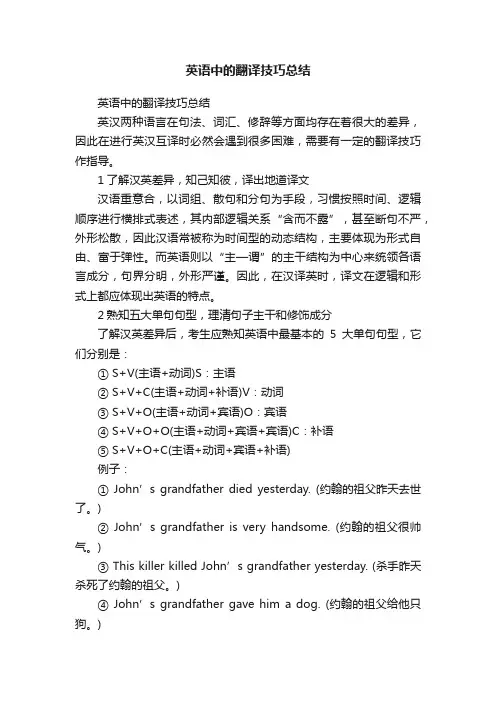
英语中的翻译技巧总结英语中的翻译技巧总结英汉两种语言在句法、词汇、修辞等方面均存在着很大的差异,因此在进行英汉互译时必然会遇到很多困难,需要有一定的翻译技巧作指导。
1了解汉英差异,知己知彼,译出地道译文汉语重意合,以词组、散句和分句为手段,习惯按照时间、逻辑顺序进行横排式表述,其内部逻辑关系“含而不露”,甚至断句不严,外形松散,因此汉语常被称为时间型的动态结构,主要体现为形式自由、富于弹性。
而英语则以“主—谓”的主干结构为中心来统领各语言成分,句界分明,外形严谨。
因此,在汉译英时,译文在逻辑和形式上都应体现出英语的特点。
2熟知五大单句句型,理清句子主干和修饰成分了解汉英差异后,考生应熟知英语中最基本的5大单句句型,它们分别是:① S+V(主语+动词)S:主语② S+V+C(主语+动词+补语)V:动词③ S+V+O(主语+动词+宾语)O:宾语④ S+V+O+O(主语+动词+宾语+宾语)C:补语⑤ S+V+O+C(主语+动词+宾语+补语)例子:① John’s grandfather died yesterday. (约翰的祖父昨天去世了。
)② John’s grandfather is very handsome. (约翰的祖父很帅气。
)③ This killer killed John’s grandfather yesterday. (杀手昨天杀死了约翰的祖父。
)④ John’s grandfather gave him a dog. (约翰的祖父给他只狗。
)⑤ John’s g randfather called him a dog. (约翰的祖父骂他是只狗)在汉译英时,不管汉语句子如何复杂,首先要考虑英语的基本组句框架。
这些最基本的框架可以变换,可以组合,但不能突破。
组织英语句子时,始终不能脱离“主—谓”主干这一总框架,然后在进行相应的时态变化、语态变化、句式转换(肯定式、否定式、疑问式、强调句式及倒装句式等),增加定语、状语修饰成分、插入语等。
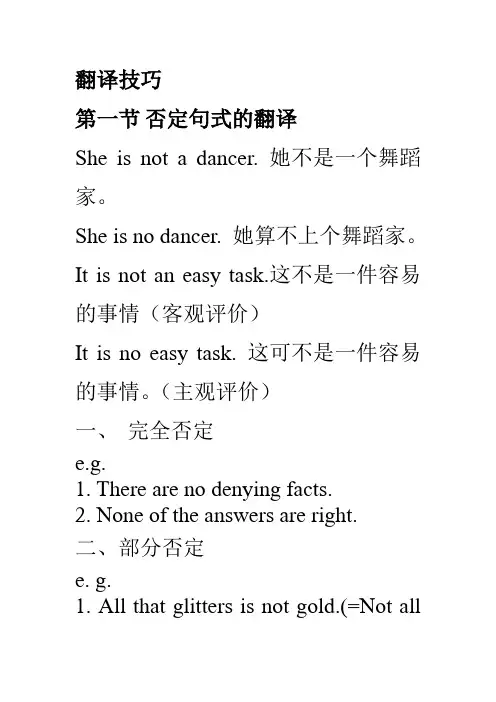
翻译技巧第一节否定句式的翻译She is not a dancer. 她不是一个舞蹈家。
She is no dancer. 她算不上个舞蹈家。
It is not an easy task.这不是一件容易的事情(客观评价)It is no easy task. 这可不是一件容易的事情。
(主观评价)一、完全否定e.g.1. There are no denying facts.2. None of the answers are right.二、部分否定e. g.1. All that glitters is not gold.(=Not allthat glitters is gold.) 闪光的不都是金子。
None that glitters is gold. 闪光的都不是金子。
Glitter/ twinkle/ sparkle/ flash/ shine/ brighten/ light/ lit/ blink/ glisten/ gleam/ flame/ illuminate / glow / glorify2. I do not want everything.I do not want anything.三、形式否定1、cannot ….too…. 意思是不可能是过分的,一般翻译为无论怎样…都不过分1)We cannot estimate the value of modern science too much.2) We cannot be too careful in doingexperiments.2. It is adj. + N. + that + 否定从句1). It is a wise man that never makes mistakes. 再聪明的人也会犯错误。
2)It is a good horse that never stumbles and a good wife that never grumbles.3. too…..to….. 太。

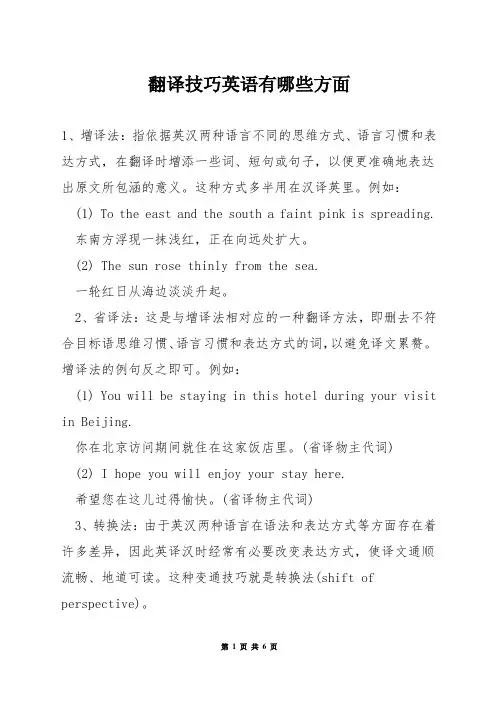
翻译技巧英语有哪些方面1、增译法:指依据英汉两种语言不同的思维方式、语言习惯和表达方式,在翻译时增添一些词、短句或句子,以便更准确地表达出原文所包涵的意义。
这种方式多半用在汉译英里。
例如:(1) To the east and the south a faint pink is spreading.东南方浮现一抹浅红,正在向远处扩大。
(2) The sun rose thinly from the sea.一轮红日从海边淡淡升起。
2、省译法:这是与增译法相对应的一种翻译方法,即删去不符合目标语思维习惯、语言习惯和表达方式的词,以避免译文累赘。
增译法的例句反之即可。
例如:(1) You will be staying in this hotel during your visit in Beijing.你在北京访问期间就住在这家饭店里。
(省译物主代词)(2) I hope you will enjoy your stay here.希望您在这儿过得愉快。
(省译物主代词)3、转换法:由于英汉两种语言在语法和表达方式等方面存在着许多差异,因此英译汉时经常有必要改变表达方式,使译文通顺流畅、地道可读。
这种变通技巧就是转换法(shift of perspective)。
4、合并法:由于文化上的差异,英译汉时有时直译原文就会使译入语读者感到费解,甚至误解。
这时,就有必要借用汉语中意义相同或相近、且具有自己鲜亮文化色彩的表达法对原文加以归化。
归化翻译法常用于处理某些英语成语、典故、形象词语等一类文化色彩较浓的表达方式。
恰倒好处地归化可以使译文地道简洁、生动活泼,便于译入语读者理解和接受。
例如:as timid as a hare 胆小如鼠at a stones throw一箭之遥翻译技巧的掌握帮助我们更好融入世界,翻译为我们搭起了各国之间的桥梁,翻译也越来越引起人们的重视。
为了培养更多的翻译人才,中国外文局教育培训中心始终保持专业、革新、开放的理念,精心打造全国复合型国际化人才培养施行基地和全国跨语言跨文化培训服务综合平台,为中国走向世界架桥铺路,为实现"中国梦'努力奉献。
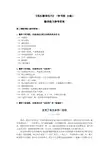
《英汉翻译技巧》(钟书能主编)翻译练习参考答案第1章翻译练习参考答案:1. 翻译下列词组,注意表达出原文词组的真实含义:(1)电线杆(2)洗耳恭听(3)感到害怕(4)令人扫兴的事或人(5)旧瓶装新酒(6)容易干的事、不重要的事情(7)有贵族血统的、出生名门的(8)生手、没经验的人(9)成或败(10)笑里藏刀2. 翻译下列词组,注意译文的“忠实性”:(1)东西保存时间长,终会派上好用场。
(2)得之艰难失之易。
(3)她来自于丹佛市附近的一个名不见经传的小镇。
(4)她买了13个鸡蛋。
(5)你占着那么多东西,而你自己又不想用,不就像狗占马槽吗?(6)他做事很老成。
(7)众所周知,过胖或过瘦肯定都是不健康的。
(8)我不知道他是否是个内奸。
(9)没有工具,人便一事无成;有了工具,人便无所不能。
(10)这两个星期,我一直坐卧不安地等待结果。
3. 翻译下面语篇,注意译文的“忠实性”和“流畅性”:改变了我生命的一封信丹尼斯·史密斯那时,我还不到30岁,在南布朗克斯第82消防支队做消防员,那也许是当时世界上最忙的消防队了。
一个星期天,天气晴和温暖,人们闲暇无事,邻近社区的活动也就比平时更多,消防员的任务也比平时更多。
那一天,我们肯定接到过15次或20次火警电话,最大的火灾发生在一栋废弃楼房背后的一个车库,光棉裹的水管就拖拽了有600英尺长。
在没有出警任务的间隙里,我会赶紧跑到队里办公室去读葛瑞队长的那份周日版《纽约时报》。
时近傍晚,我才终于读到了“书评”栏目。
一读之下,不由得怒火中烧。
有一篇文章居然公开宣称:诺贝尔文学奖得主,爱尔兰文艺复兴运动的领袖——威廉·巴特勒·叶芝超越了其爱尔兰精神,将永远作为一位世界诗人而被人铭记。
而我认为这简直是胡说八道。
对叶芝这份爱尔兰遗产,我十分引以为豪,很少有什么东西能够胜之。
我服兵役时曾从兵营书架上拿起一本叶芝的诗集,从那时起,他就成为了我最喜爱的爱尔兰作家,其次才是希恩·奥凯西和詹姆斯·乔伊斯。
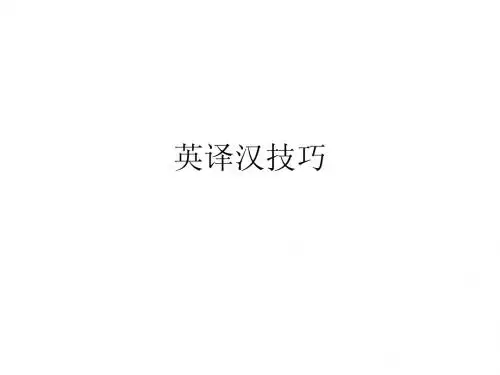
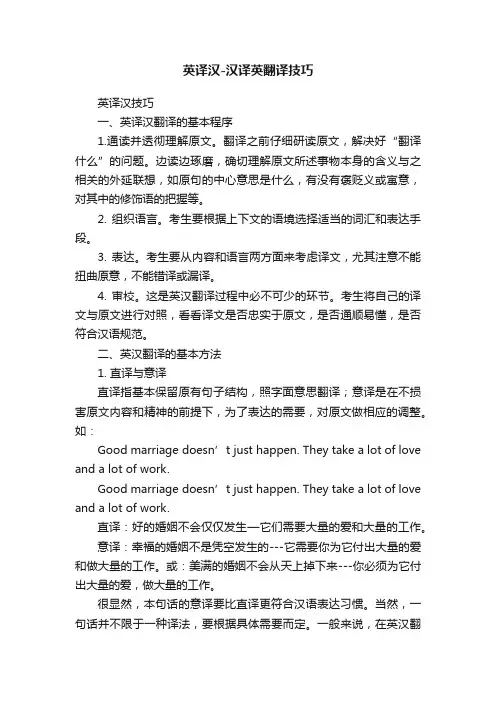
英译汉-汉译英翻译技巧英译汉技巧一、英译汉翻译的基本程序1.通读并透彻理解原文。
翻译之前仔细研读原文,解决好“翻译什么”的问题。
边读边琢磨,确切理解原文所述事物本身的含义与之相关的外延联想,如原句的中心意思是什么,有没有褒贬义或寓意,对其中的修饰语的把握等。
2. 组织语言。
考生要根据上下文的语境选择适当的词汇和表达手段。
3. 表达。
考生要从内容和语言两方面来考虑译文,尤其注意不能扭曲原意,不能错译或漏译。
4. 审校。
这是英汉翻译过程中必不可少的环节。
考生将自己的译文与原文进行对照,看看译文是否忠实于原文,是否通顺易懂,是否符合汉语规范。
二、英汉翻译的基本方法1. 直译与意译直译指基本保留原有句子结构,照字面意思翻译;意译是在不损害原文内容和精神的前提下,为了表达的需要,对原文做相应的调整。
如:Good marriage doesn’t just happen. They take a lot of love and a lot of work.Good marriage doesn’t just happen. They take a lot of love and a lot of work.直译:好的婚姻不会仅仅发生—它们需要大量的爱和大量的工作。
意译:幸福的婚姻不是凭空发生的---它需要你为它付出大量的爱和做大量的工作。
或:美满的婚姻不会从天上掉下来---你必须为它付出大量的爱,做大量的工作。
很显然,本句话的意译要比直译更符合汉语表达习惯。
当然,一句话并不限于一种译法,要根据具体需要而定。
一般来说,在英汉翻译考试中,如果直译能达意就用直译,如果直译效果不好,就应该考虑意译。
只要译文内容忠实,意思明白就行了。
2. 顺译法(又名句型对应法)顾名思义,顺译法(句型对应法)就是按原文句子结构的排列顺序进行翻译,这种译法适合于原文叙述层次与汉语相近的长句翻译,如只含名词性从句的复合句、前置的状语从句或从句在后的长复合句等等。
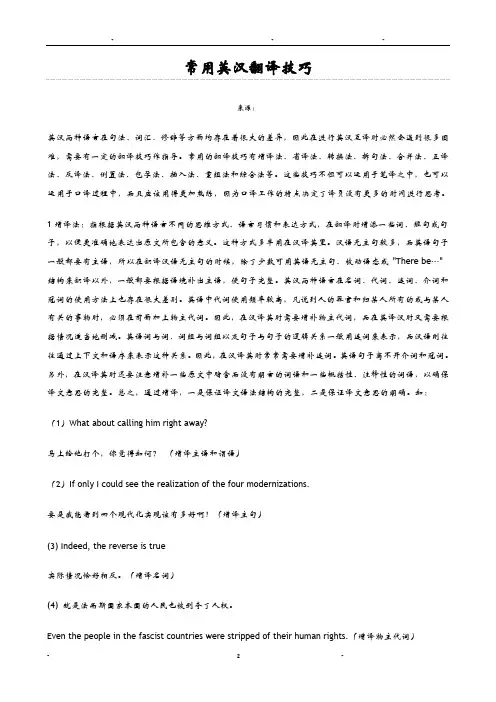
来源:英汉两种语言在句法、词汇、修辞等方面均存在着很大的差异,因此在进行英汉互译时必然会遇到很多困难,需要有一定的翻译技巧作指导。
常用的翻译技巧有增译法、省译法、转换法、拆句法、合并法、正译法、反译法、倒置法、包孕法、插入法、重组法和综合法等。
这些技巧不但可以运用于笔译之中,也可以运用于口译过程中,而且应该用得更加熟练,因为口译工作的特点决定了译员没有更多的时间进行思考。
1增译法:指根据英汉两种语言不同的思维方式、语言习惯和表达方式,在翻译时增添一些词、短句或句子,以便更准确地表达出原文所包含的意义。
这种方式多半用在汉译英里。
汉语无主句较多,而英语句子一般都要有主语,所以在翻译汉语无主句的时候,除了少数可用英语无主句、被动语态或"There be…"结构来翻译以外,一般都要根据语境补出主语,使句子完整。
英汉两种语言在名词、代词、连词、介词和冠词的使用方法上也存在很大差别。
英语中代词使用频率较高,凡说到人的器官和归某人所有的或与某人有关的事物时,必须在前面加上物主代词。
因此,在汉译英时需要增补物主代词,而在英译汉时又需要根据情况适当地删减。
英语词与词、词组与词组以及句子与句子的逻辑关系一般用连词来表示,而汉语则往往通过上下文和语序来表示这种关系。
因此,在汉译英时常常需要增补连词。
英语句子离不开介词和冠词。
另外,在汉译英时还要注意增补一些原文中暗含而没有明言的词语和一些概括性、注释性的词语,以确保译文意思的完整。
总之,通过增译,一是保证译文语法结构的完整,二是保证译文意思的明确。
如:(1)What about calling him right away?马上给他打个,你觉得如何?(增译主语和谓语)(2)If only I could see the realization of the four modernizations.要是我能看到四个现代化实现该有多好啊!(增译主句)(3) Indeed, the reverse is true实际情况恰好相反。
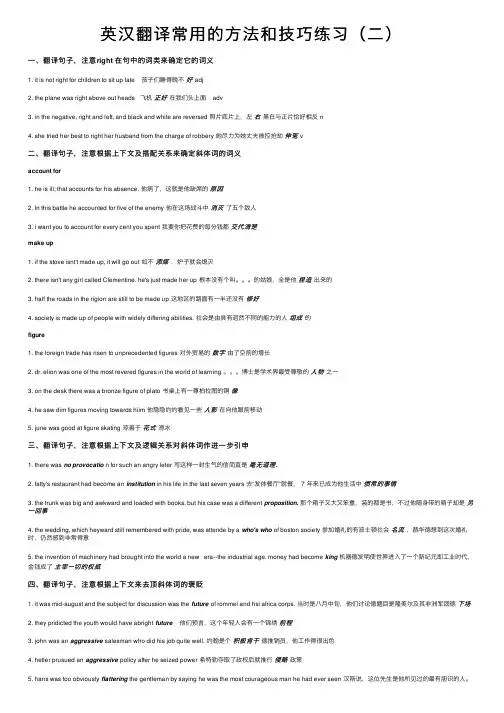
英汉翻译常⽤的⽅法和技巧练习(⼆)⼀、翻译句⼦,注意right 在句中的词类来确定它的词义1. it is not right for children to sit up late 孩⼦们睡得晚不好adj2. the plane was right above out heads 飞机正好在我们头上⾯ adv3. in the negative, right and left, and black and white are reversed照⽚底⽚上,左右⿊⽩与正⽚恰好相反n4. she tried her best to right her husband from the charge of robbery她尽⼒为她丈夫被控抢劫伸冤v⼆、翻译句⼦,注意根据上下⽂及搭配关系来确定斜体词的词义account for1. he is ill; that accounts for his absence.他病了,这就是他缺席的原因2. In this battle he accounted for five of the enemy他在这场战⽃中消灭了五个敌⼈3. i want you to account for every cent you spent我要你把花费的每分钱都交代清楚make up1. if the stove isnt't made up, it will go out如不添煤,炉⼦就会熄灭2. there isn't any girl called Clementine. he's just made her up根本没有个叫。
的姑娘,全是他捏造出来的3. half the roads in the rigion are still to be made up这地区的路⾯有⼀半还没有修好4. society is made up of people with widely differing abilities.社会是由具有迥然不同的能⼒的⼈组成的figure1. the foreign trade has risen to unprecedented figures对外贸易的数字由了空前的增长2. dr. elion was one of the most revered figures in the world of learning。
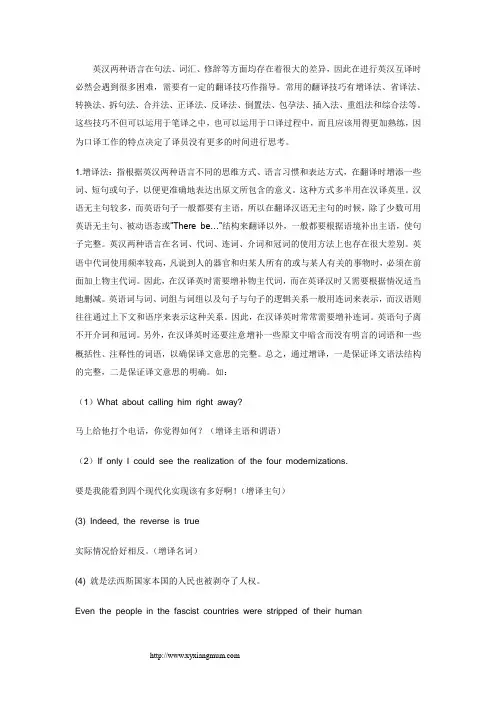
英汉两种语言在句法、词汇、修辞等方面均存在着很大的差异,因此在进行英汉互译时必然会遇到很多困难,需要有一定的翻译技巧作指导。
常用的翻译技巧有增译法、省译法、转换法、拆句法、合并法、正译法、反译法、倒置法、包孕法、插入法、重组法和综合法等。
这些技巧不但可以运用于笔译之中,也可以运用于口译过程中,而且应该用得更加熟练,因为口译工作的特点决定了译员没有更多的时间进行思考。
1.增译法:指根据英汉两种语言不同的思维方式、语言习惯和表达方式,在翻译时增添一些词、短句或句子,以便更准确地表达出原文所包含的意义。
这种方式多半用在汉译英里。
汉语无主句较多,而英语句子一般都要有主语,所以在翻译汉语无主句的时候,除了少数可用英语无主句、被动语态或"There be…"结构来翻译以外,一般都要根据语境补出主语,使句子完整。
英汉两种语言在名词、代词、连词、介词和冠词的使用方法上也存在很大差别。
英语中代词使用频率较高,凡说到人的器官和归某人所有的或与某人有关的事物时,必须在前面加上物主代词。
因此,在汉译英时需要增补物主代词,而在英译汉时又需要根据情况适当地删减。
英语词与词、词组与词组以及句子与句子的逻辑关系一般用连词来表示,而汉语则往往通过上下文和语序来表示这种关系。
因此,在汉译英时常常需要增补连词。
英语句子离不开介词和冠词。
另外,在汉译英时还要注意增补一些原文中暗含而没有明言的词语和一些概括性、注释性的词语,以确保译文意思的完整。
总之,通过增译,一是保证译文语法结构的完整,二是保证译文意思的明确。
如:(1)What about calling him right away?马上给他打个电话,你觉得如何?(增译主语和谓语)(2)If only I could see the realization of the four modernizations.要是我能看到四个现代化实现该有多好啊!(增译主句)(3) Indeed, the reverse is true实际情况恰好相反。
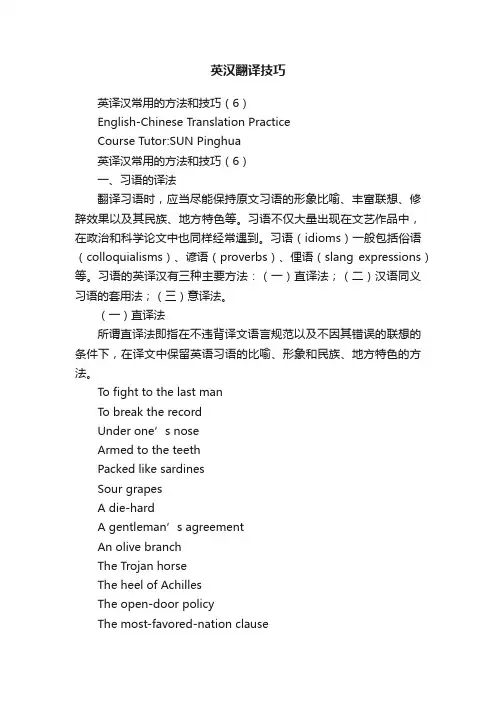
英汉翻译技巧英译汉常用的方法和技巧(6)English-Chinese Translation PracticeCourse Tutor:SUN Pinghua英译汉常用的方法和技巧(6)一、习语的译法翻译习语时,应当尽能保持原文习语的形象比喻、丰富联想、修辞效果以及其民族、地方特色等。
习语不仅大量出现在文艺作品中,在政治和科学论文中也同样经常遇到。
习语(idioms)一般包括俗语(colloquialisms)、谚语(proverbs)、俚语(slang expressions)等。
习语的英译汉有三种主要方法:(一)直译法;(二)汉语同义习语的套用法;(三)意译法。
(一)直译法所谓直译法即指在不违背译文语言规范以及不因其错误的联想的条件下,在译文中保留英语习语的比喻、形象和民族、地方特色的方法。
To fight to the last manTo break the recordUnder one’s noseArmed to the teethPacked like sardinesSour grapesA die-hardA gentleman’s agreementAn olive branchThe Trojan horseThe heel of AchillesThe open-door policyThe most-favored-nation clauseThe position-of-strength policyShuttle diplomacyThe cold warA cat has nine livesBlood is thicker than waterBarking dogs do not biteA rolling stone gathers no moss战斗到最后一个人打破记录在某人鼻子底下武装到牙齿挤得象罐头沙丁鱼酸葡萄死硬派君子协定橄榄树枝特洛伊木马阿基里斯的脚踵悬挂在达摩克里斯头顶上的剑门户开放政策最惠国条款实力地位政策穿梭外交冷战热战猫有九命血浓于水吠犬不咬人滚石不生苔(二)汉语同义习语的套用法有的英语习语和汉语同义习语在内容和形式上都相符合,双方不但有相同的意义和修辞色彩,并且有相同的或大体相同的形象比喻。
英译汉的主要翻译技巧分句法例1. The number of the young people in the United States who can`t read is incredible about one in four.我们应该把它译为: 大约有1/4的美国青年人没有阅读能力, 这简直令人难以置信。
例2. Television, it is often said, keeps one informed about current events, allow one to follow the latest developments in science and politics, and offers an endless series of programmes which are both instructive and entertaining.分析: 在此长句中, 有一个插入语“it is often said”, 三个并列的谓语结构, 还有一个定语从句, 这三个并列的谓语结构尽管在结构上同属于同一个句子,但都有独立的意义, 因此在翻译时, 可以采用分句法, 按照汉语的习惯把整个句子分解成几个独立的分句, 结果为:人们常说, 通过电视可以了解时事, 掌握科学和政治的最新动态。
从电视里还可以看到层出不穷、既有教育意义又有娱乐性的新节目。
例3. All they have to do is press a button, and they can see plays, films, operas, and shows of every kind, not to mention political discussions and the latest exciting football match.他们所必须做的只是按一下开关。
开关一开, 就可以看到电视剧、电影、歌剧, 以及其他各种各样的文艺节目。
英语翻译策略英语翻译策略是指将英文词句准确、流畅地翻译成中文的一系列方法和技巧。
以下是几种常用的英语翻译策略:1. 直译法:根据英文原文的语法结构和意思直接翻译成中文,不做过多调整和变动。
这种方法适用于简单明了的句子和短语,但是对于含有习语和俚语的句子可能会造成理解上的困惑。
例如,将句子 "It's raining cats and dogs." 直译成 "下着Cats and dogs."。
2. 释义法:根据英文单词或句子的意思进行翻译,而不一定要按照原文的词序和句法结构进行翻译。
该方法适用于需要解释或概括英文原文意思的情况。
例如,将句子 "He's burning the midnight oil." 释义为 "他正在熬夜工作。
"3. 调整法:在翻译过程中,根据目标语言的语法和语言习惯对英文原文做出适当的调整。
这种方法适用于解决语言结构和用词的冲突。
例如,将句子 "I am go to the store." 调整为 "I am going to the store."4. 文化转换法:在翻译过程中,考虑到英文和中文在文化、历史和社会背景上的差异,采取相应的翻译策略,使译文更符合目标语言的习惯和文化特点。
例如,将句子 "She is a lady killer." 翻译为 "她很有魅力。
"5. 意译法:在翻译过程中,根据句子的意思进行翻译,而不是逐字逐句地翻译。
该方法适用于理解不同语言的表达方式和文化内涵。
例如,将句子 "It's a piece of cake." 意译为 "这很容易。
"6. 联想法:根据英文原文的上下文和语境进行翻译,结合自己的联想和经验,准确地表达原文的含义。
英汉翻译常用技巧:增译法和省译法英汉翻译常用技巧:增译法和省译法英汉两种语言在句法、词汇、修辞等方面均存在着很大的差异,因此在进行英汉互译时必然会遇到很多困难,需要有一定的翻译技巧作指导。
下面是店铺整理的两种常用的翻译技巧,希望能帮到大家!增译法英汉两种语言在句法、词汇、修辞等方面均存在着很大的差异,因此在进行英汉互译时必然会遇到很多困难,需要有一定的翻译技巧作指导。
常用的翻译技巧有增译法、省译法、转换法、拆句法、合并法、正译法、反译法、倒置法、包孕法、插入法、重组法和综合法等。
这些技巧不但可以运用于笔译之中,也可以运用于口译过程中,而且应该用得更加熟练,因为口译工作的'特点决定了译员没有更多的时间进行思考。
1、增译法:指根据英汉两种语言不同的思维方式、语言习惯和表达方式,在翻译时增添一些词、短句或句子,以便更准确地表达出原文所包含的意义。
这种方式多半用在汉译英里。
汉语无主句较多,而英语句子一般都要有主语,所以在翻译汉语无主句的时候,除了少数可用英语无主句、被动语态或"There be…"结构来翻译以外,一般都要根据语境补出主语,使句子完整。
英汉两种语言在名词、代词、连词、介词和冠词的使用方法上也存在很大差别。
英语中代词使用频率较高,凡说到人的器官和归某人所有的或与某人有关的事物时,必须在前面加上物主代词。
因此,在汉译英时需要增补物主代词,而在英译汉时又需要根据情况适当地删减。
英语词与词、词组与词组以及句子与句子的逻辑关系一般用连词来表示,而汉语则往往通过上下文和语序来表示这种关系。
因此,在汉译英时常常需要增补连词。
英语句子离不开介词和冠词。
另外,在汉译英时还要注意增补一些原文中暗含而没有明言的词语和一些概括性、注释性的词语,以确保译文意思的完整。
总之,通过增译,一是保证译文语法结构的完整,二是保证译文意思的明确。
如:(1)What about calling him right away?马上给他打个电话,你觉得如何? (增译主语和谓语)(2)If only I could see the realization of the four modernizations.要是我能看到四个现代化实现该有多好啊!(增译主句)(3) Indeed, the reverse is true实际情况恰好相反。
英译汉常用的方法和技巧(6)English-Chinese Translation PracticeCourse Tutor:SUN Pinghua英译汉常用的方法和技巧(6)一、习语的译法翻译习语时,应当尽能保持原文习语的形象比喻、丰富联想、修辞效果以及其民族、地方特色等。
习语不仅大量出现在文艺作品中,在政治和科学论文中也同样经常遇到。
习语(idioms)一般包括俗语(colloquialisms)、谚语(proverbs)、俚语(slang expressions)等。
习语的英译汉有三种主要方法:(一)直译法;(二)汉语同义习语的套用法;(三)意译法。
(一)直译法所谓直译法即指在不违背译文语言规范以及不因其错误的联想的条件下,在译文中保留英语习语的比喻、形象和民族、地方特色的方法。
To fight to the last manTo break the recordUnder one’s noseArmed to the teethPacked like sardinesSour grapesA die-hardA gentleman’s agreementAn olive branchThe Trojan horseThe heel of AchillesThe open-door policyThe most-favored-nation clauseThe position-of-strength policyShuttle diplomacyThe cold warA cat has nine livesBlood is thicker than waterBarking dogs do not biteA rolling stone gathers no moss战斗到最后一个人打破记录在某人鼻子底下武装到牙齿挤得象罐头沙丁鱼酸葡萄死硬派君子协定橄榄树枝特洛伊木马阿基里斯的脚踵悬挂在达摩克里斯头顶上的剑门户开放政策最惠国条款实力地位政策穿梭外交冷战热战猫有九命血浓于水吠犬不咬人滚石不生苔(二)汉语同义习语的套用法有的英语习语和汉语同义习语在内容和形式上都相符合,双方不但有相同的意义和修辞色彩,并且有相同的或大体相同的形象比喻。
在这种情况下,汉译时可以直截了当地套用汉语同义习语。
例如:1.双方有完全相同的形象比喻:To praise to the skies To fish in troubled waters To add fuel to the fire捧上天去浑水摸鱼火上加油To be on thin ice Walls have ears Strike while the iron is hot如履薄冰隔墙有耳趁热打铁2.双方有大体相同的形象比喻:A drop in he ocean To laugh off one’s headTo shed crocodile tears To be out at elbowsTo spend money like water At sixes and sevensSix of one and half a dozen of the otherOne boy is a boy, two boys half a boy, three boys no boy沧海一粟笑掉牙齿猫哭耗子促襟见肘挥金如土七颠八倒;乱七八糟半斤八两一个和尚挑水吃,两个和尚抬水吃,三个和尚没水吃(三)意译法Many kiss the baby for the nurse’s sake. 醉翁之意不在酒。
Love me, love my dog. 爱屋及乌。
Give me liberty or give me death. 不自由,毋宁死。
To pay Chinese compliments 阳奉阴违To hold a candle to the devil 助纣为虐Let speak frankly./ to put all the cards on the table 打开天窗说亮话It’s unnecessary anxiety. 杞人忧天We’ve been driven to it. 逼上梁山。
It is better for the doer to undo what he has done. 解铃还待系铃人。
To pick on something to find fault with 吹毛求疵To cast off one’s old self and take on new self 脱胎换骨Who chooses well chooses sons-in-law; who chooses badly chooses land. 会选的选儿郎,不会选的选田庄。
A fall into the pit, a gain in your wit. 吃一堑,长一智。
To be in the same boat 同舟共济Like a drowned rat 像个落汤鸡Strike while the iron’s hot. 趁热打铁。
I have been a stranger in a strange land. 独在异地为异客。
Castle in the air 空中楼阁Give him an inch and he’ll take an ell. 得寸进尺。
Time flies like an arrow. 光阴似箭。
Nothing comes wrong to the hungry. 饥不择食。
Birds of a feather flock together. 物以类聚。
There is no smoke without fire. 无火不起烟。
To know like the palm of one’s hand 了如指掌To throw cold water on 浇冷水Facts speak louder than words. 事实胜于雄辩。
The burnt child dreads the fire. 一朝遭蛇咬,三年怕井绳。
Even an honest official can’t judge domestic cases. 清官难断家务事。
A long road tests a horse’s strength and a long task proves a man’s heart. 路遥知马力,事久见人心。
The teenagers don’t invite Bob to their parties because he is a wet blanket.Among so many well-dressed and cultured people, the country girl felt like a fish out of water.All right, I blame myself. But it’s the last time. We were cat’s-paws, that’s all.To break the ice, Ted spoke of his interest in mountain climbing, and they soon had a conversation going.She was born with a silver spoon in her mouth; she thinks she can do what she likes.Two heads are better than one. (三个臭皮匠胜过诸葛亮。
)一人不及两人智。
If you run after two hares, you will catch neither. 脚踏两头船,必定落空。
It’s no use crying over spilt milk.When the cat’s away, the mice will play. 猫儿不在,鼠儿成精。
A stitch in time saves nine. 及时缝一针,可以省九针。
注意:有时可以把英语原文中的非习语译为汉语习语,是译文生动有力:But against the vast expanse of the sky, the chute looked very small. Over the past several weeks, she had grown increasingly restless.It is clear that he was one of the outstanding pilots in the whole program. It was nervous before crowds.The mere thought of appearing before a crowd frightened me.The guest was pleased by the distinction but not overwhelmed.但是,习语的使用不能违背忠实、通顺的翻译标准。
如:The aircraft is small, cheap, pilotless.It was a chilly day in early spring.Earthy and gracious, he finds the city dwellers too cold and sophisticated.练习题一、试用汉语同义习语翻译下列各习语:1. To take French leave2. A stony heart3. At one’s fingertips4. To have a hand like a foot5. As mute as a fish6. To return good for evil7. To shut one’s eyes against 8. To talk black into white 9. To turn a deaf ear to 10. Practice makes perfect.11. To face the music 12. Plain sailing13. To be dead drunk 14. Laugh and grow fat15. Tweedledee and tweedledum 16. To fly into a rage17. To look for a needle in a haystack 18. A leap in the dark 19. To show one’s colours 20. To make a noise in the world21. More haste, less speed 22. Neither fish nor flesh 23. To pick holes in 24. To mind one’s P’s and Q’s25. To be at the end of one’s rope 26. To flog a dead horse27. To turn over a new leaf 28. To put all one’s eg gs in one basket二、试译下列各句:1. He just had forty winks.2. His wife held the purse string.3. You should keep your nose out of here.4. Don’t you see the writing on the wall?5. that night he slept like a top, and woke with his knee of almost normal size.6. I’m not talking about castles in the air—the donkey’s carrot. No, I mean something we’ve all shared.7. Mother said, “John, you’re talking through your hat. You’re crazy!”8. His accent gave him away.9. Large police forces were encamped near the meeting, out of sight but hardly out of mind.10. The Nazis in Berlin became desperate and tried to make hell while the sun was shining.三、试译下列各句,注意运用汉语习语翻译斜体部分:1. By comparison, the Great Wall in China is a mammoth presence.2. After that the special missions became frequent occurrences.3. Yet there was no hint as to who had irresponsibly started this fiction in the first place. Or why?4. On careful analysis it appears that the information was erroneous or was susceptible of varying interpretations.5. In a dangerous and uncertain world, the strengthening of national defence is the best guarantee of a nati on’s vital interests.6. He wads confronted by the wild irrationality, the deviousness, the maliciousness and venality of the Manchu officials.7. His body was perfect, alive with easy suppleness and health and strength.8. A vision of countless colorful flowers blinded his eyes.9. And then I ell asleep and only woke at broad day.10. But far from recovering, that country remained overwhelmed by corruption, a tottering bureaucracy, surging prices and natural disasters.二、拟声词的译法凡是以摹仿事物或动作的声音而构成的词称为拟声词。